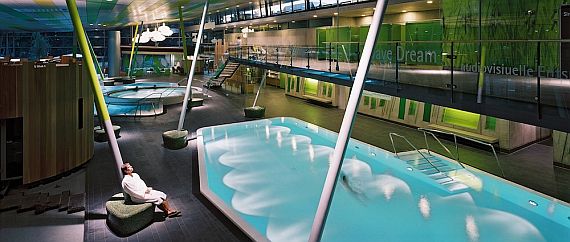
News & Stories
Warsaw. Poland has seen a dynamic expansion of both national and international chain and branded hotels in the last years. A "Guidebook" summarizes challenges and opportunities and provides investors, owners and hotel companies with figures.
Berlin. As the world gears up for 21.12.12, Papaya Playa, a Design Hotels Project in Tulum, Mexico is planning to step up its efforts in nurturing its precious environment. Papaya Playa, originally planned as a singular event has become a laboratory for alternative hospitality models.
Berlin. At ITB Berlin 2013, tours and travel packages will be sold to private visitors on the weekend of March 9 and 10 for the first time. In doing so, ITB Berlin provides all exhibitors with an additional distribution channel. The German Travel Association criticises this strongly.
Zug/Baden-Baden. With the 4-star hotel Spreewald Thermenhotel, Swiss Kannewischer Management AG, which is specialised in the construction and operation of spas and thermal spas, is breaking new ground. The family business around the management expert Stefan Kannewischer and his brother Juergen, an engineer, is well known in the spa scene. Among others, they operate the famous Caracalla Spa in Baden-Baden. Their first own hotel next to their own spa is the run up to more thermal spa hotels. They want to profit from the theme tourism trend.
Berlin. Asia continues to be the driving force in global tourism. According to the latest "ITB World Travel Trends Report", this year the number of outbound trips from Asia rose by seven percent, due in part to rising wages. Yet again, the most frequent travellers came from China and Japan, both countries reporting double-digit growth in outbound travel.
Geneva. If you did a Google search for the words "Kempinski" and "Pyongyang" this week, you got around 611,000 results. In a nutshell: Kempinski CEO Reto Wittwer caused headlines recently when he casually announced an intention to operate a hotel in Pyongyang, the capital of communist North Korea, at the beginning of November. From July or August 2013, Kempinski intends to operate the 105-storey, pyramid-shaped Ryugyong Hotel with 100 or 150, later perhaps even 350 rooms - originally, the government had planned 3,000 rooms. The monster building, the construction of which the government began as far back as the eighties and which it now wants to complete, rises to a height of 337 metres. Is Kempinski reaching for the stars? Just one day before the news came out, Wittwer made an announcement in South Korea that Kempinski intended to participate in a mega project in Seoul. Is the commitment in North and South Korea set to become a massive political balancing act?
Berlin. Berlin West catches up again: After the reunion, the eastern part of the city was long in the focus of investors and developers, now after 20 years, the page turns again to "old" Berlin around Kurfuerstendamm. The Berliners speak, in the meantime, of the "Boomtown City West". Now, as an architectural competitor to the "Zoofenster" Tower including the new Waldorf Astoria Hotel the new Tower "Upper West" was announced. And also the new tower will include a hotel: The German Motel One is the largest with 582 rooms. With this, the low budget design hotel chain has succeeded in a coup in an absolute 1A-location. However, before Upper West is opened, the "Zoobogen" on the opposite side of the street between the Zoo station and the zoo will be completed. And also to be seen there is the trendy hotel of the 25hours Hotel Company. With it, a new urbanistic development is being initiated all around the Gedaechtniskirche.
Berlin. Record results from tour organisers: The German Travel Association has recently presented results on the economic performance of the travel industry for the tourism year 2011/12. The results confirm that Germany‘s desire to travel is unbroken - as is demand for tour organisers.
Frankfurt. In future, business trips will be paperless. The traveller will check into the hotel with his smartphone and will also use this to pay for the overnight stay and all other travel services. These technologies are now forcing travel managers to change their way of thinking.
Oberursel/Frankfurt. On the one hand, Thomas Cook tries to trim its hotel brands, on the other hand, Thomas Cook separates from the club provider Aldiana.



